Anniversary Evensong at St Paul’s
20th September, 2017
The Society was honoured to be holding a special evensong at St Paul’s, where they were joined by Masters and Clerks from other Livery Companies, invited guests, and the Members of the Society.
The service was the first performance of a newly commissioned anthem by Michael Berkeley, which will become a firm fixture of future Apothecaries events.
Following the service, there was a reception at the Hall.
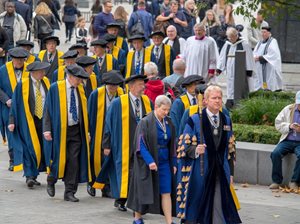
The Court process led by the Beadle
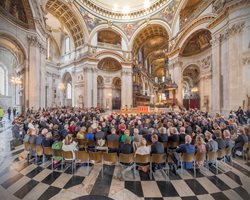
Inside St Paul’s Catherdral
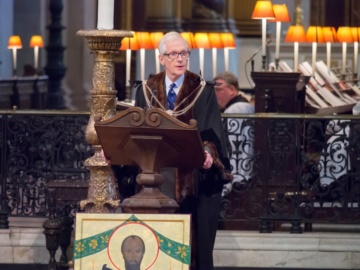
Master Apothecary, Professor Charles Mackworth-Young
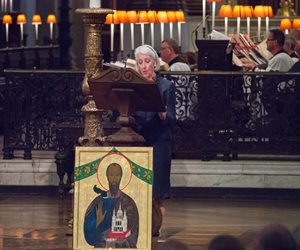
Mrs Janet Payne, Archives Office and Tour Guide at St Paul’s Cathedral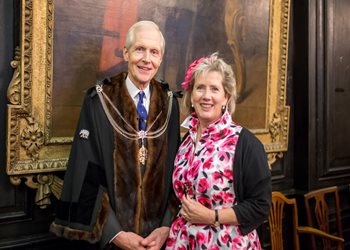
Master, Professor Charles Mackworth-Young and Mistress, Lady Iona Mackworth-Young
Apothecaries’ Hall reception with guests
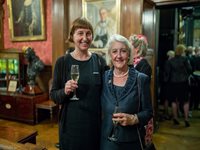
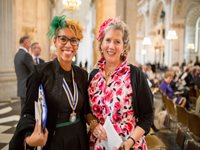
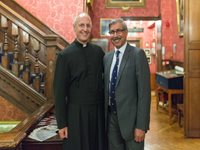
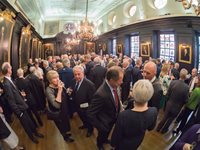
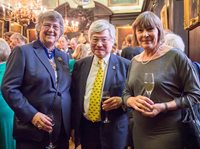
Every year the Society opens its doors for ‘Open House’ weekend. This year, our 400th Anniversary year saw the Master, Professor Charles Mackworth-Young and the Clerk and Registrar welcoming people into the building.
Once in the building, visitors were greeted by our volunteers which are our Court, staff, Archives volunteers, members of the Society who gave up their time to talk and share information about the History of the building and its current activities.
The Faculty of Conflict and Catastrophe had Dr Tim Healing, the Course Director, the President talk to people about the course, gadgets and lectures.
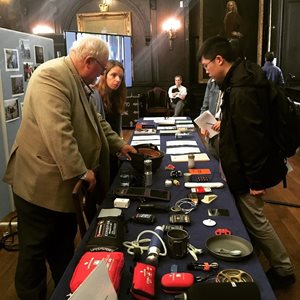
The Faculty of the History and Philosophy of Medicine and Pharmacy also had the Deputy President, Briony Hudson, Julie Papworth and Gary Clayton Jones engaging with people who had not heard about the Society or what the Faculty does. Some of our archives were also on display.
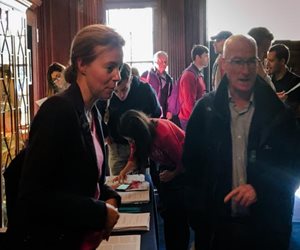
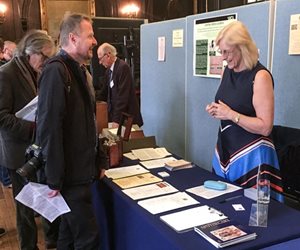
Everyone had the opportunity to explore the Court room, Parlour and entrance hall. Overall, we had 2,185 people walk through our doors.
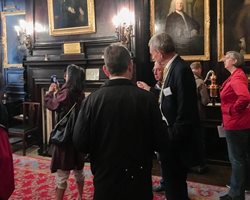
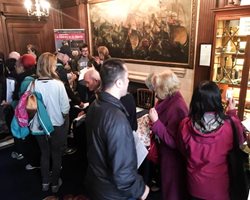
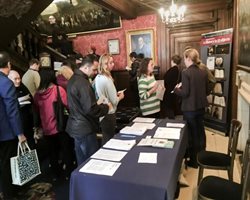
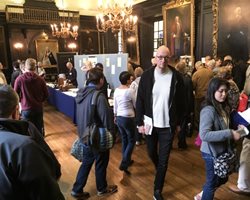
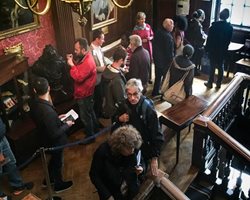
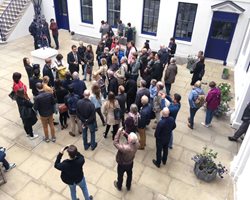
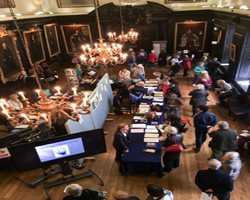
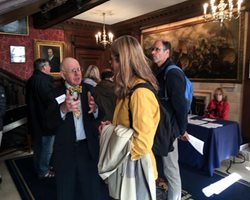
Geoffrey Flavell’s career as a thoracic surgeon spanned the development of the discipline from the surgical treatment of tuberculosis to cardiac surgery. The Flavell fund was bequested to the Faculty by the late Joan Margaret Flavell in memory of her husband.
Dr W. Bruce Fye
If you missed the lecture, please listen on soundcloud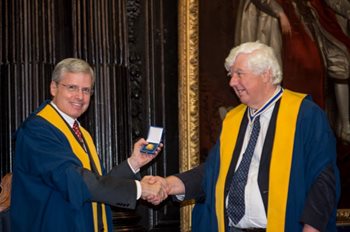
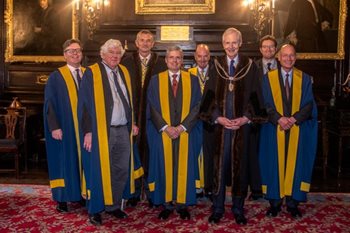
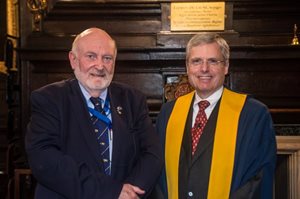
Bruce Fye (Speaker)
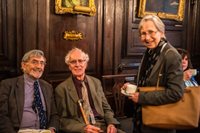
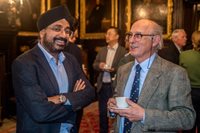
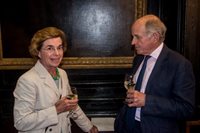

Professor Charles Mackworth-Young
It is an immense privilege to be Master of this marvelous organization in its 400th Anniversary year.
The Society of Apothecaries has a wonderful history. Since its separation from the Grocers’ Company in 1617 it has made a continuous and important contribution to the regulation and support of its profession. Its initial roles included quality control of the craft, mutual support for its practitioners and the training of apprentices. Among the Society’s many subsequent achievements, three stand out for me: following the “Rose Case” in 1704, apothecaries became forerunners of today’s general practitioners; the passing of the Apothecaries Act in 1815 enabled the Society to regulate the medical profession, thus making it a forerunner of today’s General Medical Council; and its own qualification, the Licence in Medicine and Surgery of the Society of Apothecaries (LMSSA), was awarded until 2003.
Today the Society has an active academic programme. This includes Faculties in the History and Philosophy of Medicine and Pharmacy and in Conflict and Catastrophe Medicine. It runs seven postgraduate diplomas: two of these are requirements for medical trainees in those specialties, and one is taken internationally. There is an extensive range of courses and lectures, as well as an important archive. The Society has a major charitable focus, particularly supporting medical students; this has been enhanced by its recent successful 400th Anniversary Appeal. It also contributes to City functions and runs a varied social programme.
We have a thriving membership. This is largely medical, with most of the remainder being trained in pharmacy. My own background is in clinical medicine. I am a consultant rheumatologist and general physician based at Charing Cross Hospital; as a Professor of Practice at Imperial College I have particular interests in autoimmunity, research ethics and peer review; and I am Medical Director of King Edward VII’s Hospital, a charitable unit that has a particular focus on the Armed Services. I hope to bring my experience in all of these fields to my role as Master.
Our quarter centenary is an excellent time to consider the contribution that the Society has made to the development and quality of medicine and pharmacy in this country over the last four centuries. But this is also an opportunity to look forward. Our programme of anniversary events will reflect both of these aspects – surveying the past and considering the future; and I much look forward to enjoying these celebrations and other activities with members of the Society and our friends in the coming months. One of these will be an Attended Evensong in St. Paul’s Cathedral on Wednesday 20th September at 5.00p.m. This will include a specially commissioned anthem written by Michael Berkeley. Admission is free, and we would welcome people to come and share this celebration with us.
Meet our new Faculty President…
Christopher Gardner-Thorpe
MD FRCP FRCPE FACP, Consultant Neurologist
It is a great pleasure to have been appointed President of the Faculty and I shall work hard to further the aims of the Faculty as have my predecessors, and with the help of the Deputy President, Briony Hudson. My own time with the Society started when I was asked to consider becoming an examiner for the DHMSA, a post I took up with avidity, and then to be Deputy Convenor of the Examiners and thereafter also Course Director. To work with distinguished colleagues and fascinating persons, both within the Society and without, has made the last few years so enjoyable, years of continuing learning and challenges.
The Faculty promotes and teaches the history of medicine and pharmacy and the philosophy in these areas. One of the Society’s great strengths, built up over many years, is in examining. To all of this has been added recently some guidance in communication skills, in particular in relation to writing, presenting and illustrating material, with such tutoring as can be made available too. All these areas can be developed further in the courses, in individual sessions and with the involvement of those who wish to take part in the meetings of Fellows and in the Fellowship Seminars.
We form an inclusive team and are open to all constructive suggestions concerning the aims and functions of the Faculty. It has been said that organisations do not stand still but either advance or regress. We want to advance so please keep the suggestions coming in!
~

I’m delighted to take on the role of Deputy President and work closely with Christopher, Maria and the rest of the Faculty’s Executive Committee for the next 3 years. As a professional historian and museum curator, and non-medic, I hope to be able to bring some different perspectives to the opportunities and challenges we face as a Faculty. Since I first visited the Hall in 2002, I’ve been inspired by its history, its events and the opportunity to meet new and interesting people. I was excited to create a new three day History of Pharmacy and the Pharmaceutical Industry course last year and thrilled at its reception. I hope that we can continue to find a successful balance between tradition and innovation in all that we do.
Geoffrey Flavell’s career as a thoracic surgeon spanned the development of the discipline from the surgical treatment of tuberculosis to cardiac surgery. The Flavell fund was bequested to the Faculty by the late Joan Margaret Flavell in memory of her husband.
Healthcare Values Partnership on Thursday 19th June 2017
Thank you to Jon Baines Tour for sponsoring our sparkling wine reception, Briony Hudson, Nicholas Wood (Curator), Lloyd Jones (photographer), The British Red Cross, Royal College of Physicians, Rare Books Collection and Royal Pharmaceutical Society Museum
The Speakers: Dr Andrew Papanikitas, Dr Joshua Hordern, Dr Christopher Gardner-Thorpe, Dr Caroline Coats, Dr Therese Feiler and Dr David KC Cooper
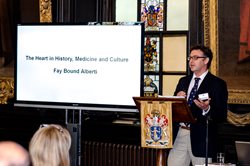
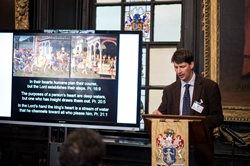
Dr Andrew Papanikitas Dr Joshua Hordern
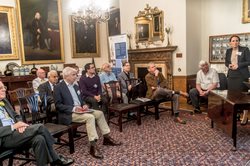
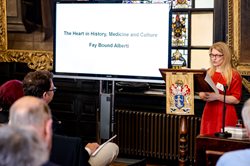
(Left image) Dr Christopher Gardner-Thorpe & Dr Caroline Coats
(Right image) Dr Fay Bound Alberti
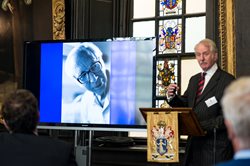
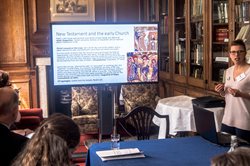
(Left image) Dr David KC Cooper (right image) Dr Therese Feiler
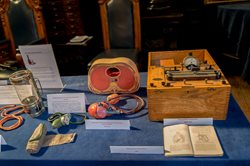
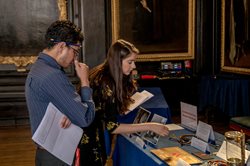
British Red Cross
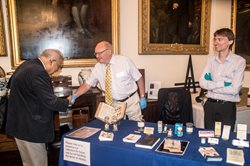
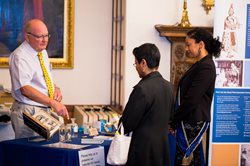
Royal Pharmaceutical Society Museum
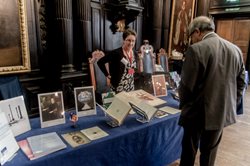
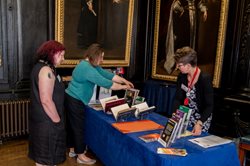
Royal College of Physicians, Rare Books Collection
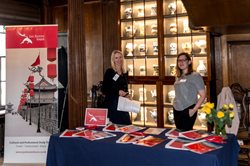
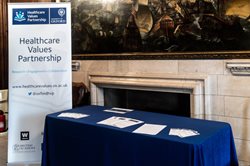
Delegates
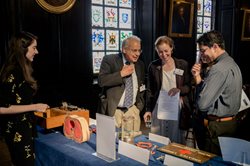
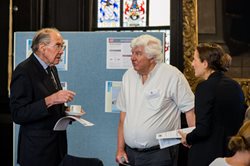
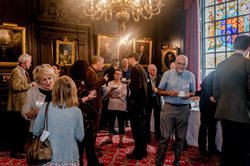
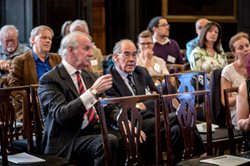
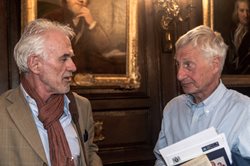
The John Locke Lecture was established in 1978 to commemorate the interest of the Faculty in the philosophy of medicine. It commemorates John Locke the 17th century physician and philosopher.
Lecture title: Compassion in Healthcare; Practical Policy for Civic Life
Speaker: Dr Joshua Hordern
Lecture date: Thursday 29th June 2017
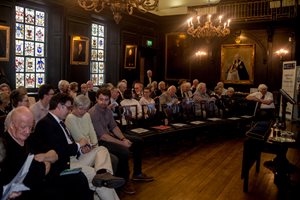
Guests anticipate the start of the lecture
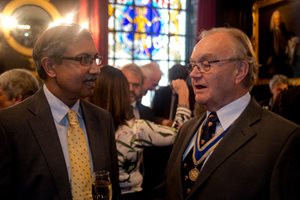
Guests in the Court room
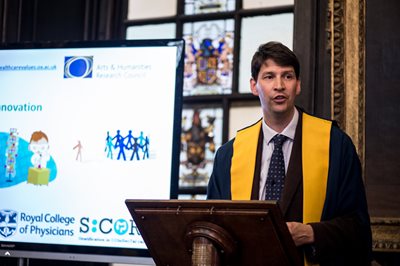
Dr Joshua Hordern – Speaker
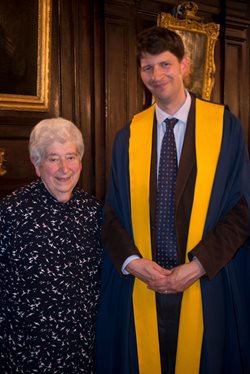
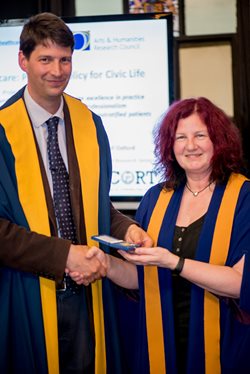
The vote of thanks given Jean Gaffin Dr Hordern receiving his medal from Dr Tina Matthews (President)
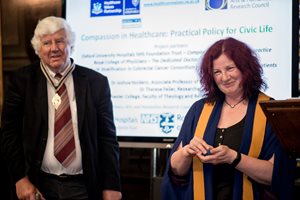 The Faculty welcomes Dr Christopher Gardner-Thorpe as the new President
The Faculty welcomes Dr Christopher Gardner-Thorpe as the new President
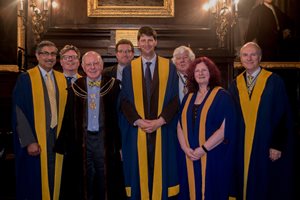
(Left to Right) Dr A Mozumder (Dean), Dr P O’Mordha, Dr D Adams (Master), Mr N Royle(Clerk), Dr C Gardner-Thorpe (President of the Faculty), Dr T Matthews and
Mr Nicholas Wood (Curator)
Professor Rodney Taylor, 1942 – 2017
We are saddened to send you news of the recent death of Professor Rodney Taylor, Past Master 2012-13. Professor Taylor passed away peacefully after a long illness, with his family around him, on Wednesday 3rd May. A Service of Thanksgiving for his life will be held at 3.00 pm on Thursday 1st June at St James Church, Hampton Hill, after a quiet family-only cremation.
To mark Professor Taylor’s passing, we are reprinting below the article that he wrote for Apothecary when he became Master in August 2012, which in his own words tells of his packed life of service to family, country and the medical profession.
“The past exudes legend: one can’t make pure clay of time’s mud. There is no life that can be recaptured wholly; as it was. Which is to say that all biography is ultimately fiction”
Professor Rodney Taylor, Apothecary, 2012
Let me tell you my story. I was a war baby growing up in London, surrounded by the consequences of conflict. Born in the depths of winter I spent my early days in a drawer as there were no cots to be had.
My father, the son of a Lancashire coal merchant, was much the brightest of four siblings and graduated in chemistry from the Victoria University of Manchester. He went into fuel technology with a MSc at Manchester and a PhD at Leeds, but did not join the family business. My mother was the only daughter of a ladies’ tailor and dressmaker, married to a clerk in local government. Ladies’ tailoring involves the proper ‘building’ of ladies’ suits. My mother went to Art School to learn art, design and fabrics and was apprenticed to her mother.
My parents’ wedding was at the height of the wartime bombing in Lancashire, which caused so much concern that the doors of the chapel were locked during the ceremony, raising the question of the legality of their marriage! They moved to London for war work; he was in war service maintaining electrical power generation, and she was a school dinner lady briefly, until the need for maternity leave. Doodlebugs, the bombing of London, nights sleeping in the temporary shelter under the dining table are distant childhood recollections.
Then, after the war, I went to school in rural Botany Bay on the edge of Hertfordshire. From a tiny (two classes increased to three when I arrived) village school to The Grammar School, Enfield – a dramatic shock of scale and culture. The school, founded in 1558, grew from the fourteenth century Chantry School. It gave a traditional, classical education, covering a broad spread of the humanities for the scientists, though possibly a lesser balance in the other direction. Music, drama and the arts competed for my attention, but I went to Bristol University to read physics. Involvement in revue and the broader aspects of university life resulted in my change from the mathematical rigour of academic physics to honours in psychology, followed by a few years as a clinical psychologist. However I found that working with people whose behaviour was influenced by things going wrong in their brains needed a better understanding of neurology and, in fact, medicine.
After sixty hours work to get grade A in A level zoology, I went to University College London and thence to UCH. Fascinating times, with so much to learn that made sense and mattered. There was also Fallopians, for whom I co-directed the medical school revue. I met Janet, a fellow student, whom I subsequently married. I did both my house jobs at UCH, first on the Neurological Unit and with John Stokes, and then on the Surgical Unit. SHO posts whizzed by at an alarming pace at West Middlesex, Whittington, London Chest Hospitals, and then a Registrar post at Central Middlesex Hospital. Not neurology after all but gastroenterology; but I learned that the gut has its own nervous system, so that was all right!
It was an easy transition from registrar to DHSS Research Fellow and thence to a Wellcome Senior Research Fellowship in Clinical Science, jointly between the old MRC Gastroenterology Research Unit at Central Middlesex, the Middlesex Hospital Medical School and the University Laboratory of Physiology in Oxford. That gave a wonderful mix of basic and clinical science, presentations, publications, an MD, whilst maintaining a toe in clinical practice as senior lecturer and consultant physician.
An interest in boats, ships and the sea led me to join the London Division, Royal Naval Reserve, and this was a link that took me into the Royal Navy on a medium career 16-year commission. Despite sea-time in the RNR in the Atlantic, the Mediterranean and UK waters, proper sea-time was needed to obtain ‘sea-credibility’, so winter exercises in the Arctic and then a prolonged winter South Atlantic patrol followed, with visits to the Falkland Islands and South Georgia. On my return, after three winters back to back, I was appointed to the Royal Naval Hospital Haslar as consultant physician and gastroenterologist and subsequently Royal College of Physicians’ Professor of Naval Medicine. This appointment lasted nearly fifteen years but was interrupted by active service in the Gulf War 1990-91, in Bosnia, Kosovo and Northern Ireland, as well as occasional ‘jollies’ in Akrotiri and Gibraltar. There were a number of additional roles as Medical Director, Associate Postgraduate Dean, Consultant Advisor to the Surgeon General, and outside appointments to the Royal College of Physicians, Southampton University, the GMC, the Healthcare Commission, King’s Fund, the National Clinical Assessment Service and other national and international organisations. These roles prompted me to take an MBA. I spent eleven years on the Council of the British Society of Gastroenterology (Treasurer for six years covering UK hosting the European Gastroenterology Week in 1997) and was Medical Director of the Digestive Disorders Foundation. As I left the Navy I was holding eleven roles within the military, as well as others outside! When I retired in 2001 to the RN Emergency List (on which I remain for life) I had visited thirty-three countries in five continents in the course of my work. I returned to the NHS, taking the post of Medical Director at Ealing Hospital.
I first became involved with the Society in 1991 when I took the History of Medicine course, passing the Diploma the following year. The Philosophy of Medicine course and Diploma followed, as did involvement with the Faculty of the History and Philosophy of Medicine and Pharmacy variously as Fellow, Secretary, Deputy President, and President. I gave the Osler Lecture in 1994 and the Gideon de Laune Lecture in 2004. I have been an examiner in the history of medicine since 1996 and the Society’s Convener of Examiners in that subject 2000-04 and 2008-12. I became a Yeoman of the Society in 1997, a Liveryman in 2001, an Assistant in 2006, and joined the Private Court in 2010. I am also a Liveryman of the Barbers’ Company and gave their inaugural Charles Bernard Lecture.
Cultivation of my interest in the ethical issues around healthcare practice through the DPMSA led to taking a MA in Bioethics. This led to my current appointments as Visiting Professor in the School of Theology, Philosophy and History at St Mary’s University College, and Tutor in Medical Ethics and Law at Imperial College Faculty of Medicine.
I am a trustee and chairman of two cancer support charities, one national and one regional but open to all. I was a Churchwarden; a responsibility that involved managing an interregnum, and coming out smiling! I am a Wandsman at St Paul’s Cathedral.
My wife, Janet, is an obstetrician and gynaecologist, who is currently seconded to the NHS Institute (for Innovation and Improvement) as clinical lead for improving outcomes in maternity services. We love music, sing in Concordia, a chamber choir, and greatly enjoy opera. We also get great pleasure from boats (any, but especially yachts and narrow boats), travel, English churches and Choral Evensong. Our three children have flown the nest – a daughter who is a vet in Cheshire, an economist and linguist son turned banker in Cleveland Ohio, and a daughter who teaches in London. The first and second have parented our two grandsons and our granddaughter respectively.
The Society’s new website is a much more up to date and friendly channel of communication for all members who are able or prepared to use it. I have worked, with others, to make this so. I am totally committed to the Society and its activities, especially to ensuring that the dual celebrations of the quadricentennial anniversary of the Society in 2017 and the bicentennial of the Apothecaries’ Act in 2015 are recognised in full and appropriate style. The two Faculties, the Archives, maintained by its loyal Friends, and the Livery Committee are very much part of this and I support them wholeheartedly. The celebration and recognition of these major anniversaries involves additional fundraising to allow the Society to achieve all that it sets out to do, whilst maintaining and sustaining its normal charitable activities. Meanwhile I am committed to managing the Society’s properties responsibly and effectively as securities and as sources of income.
This might be time’s mud, but it is not fiction … not really … if at all.
The Galen medal was instituted by the Society in 1925 for valuable services or contributions rendered to the science of therapeutics. It is awarded on a broad basis, therapeutics being understood to encompass the whole spectrum of the art of healing, from preventative medicine to surgical intervention. The recipient of the medal in 2017 was Professor Dame Anne Mills of the London School of Hygiene and Tropical Medicine, a renowned expert on the financing and organisation of health care in low and middle income countries, the economics of tropical disease control (especially malaria) and in the general issues of the use of economic thinking and analysis in decision making. She received her medal from the Master at a ceremony at the Hall on 16th May, the citation being read by Dr Tim Healing.
At the same ceremony, Professor Alasdair MacLullich of the University of Edinburgh received the William Farr medal which is awarded annually to medical practitioners who have made a significant contribution to the management of illness in elderly people. His work on geriatric medicine has greatly advanced our understanding of dementia and delirium. The citation for Professor MacLullich was read by Dr Elizabeth Harper.
The Galen dinner was held in the Hall after the awards ceremony, a splendid occasion attended by more than 130 liverymen and guests.

(Left-right) Professor Dame Anne Mills & Dr Derek Adams (Master)

(Left-right) Dr Elizabeth Harper, Professor Alasdair MacLullich
& Dr Derek Adams ( Master)
Honoured guests below!












Early in May, six members of the Faculty of Conflict and Catastrophe Medicine travelled to the Curragh near Dublin to present a three-day Humanitarian Disaster Assistance Course. This course, which has been run on three previous occasions, is sponsored by the organisation Co-operation and Working Together (CAWT – which is dedicated to improving cross-border co-operation in Ireland) and hosted by the United Nations Training School in Ireland (UNTSI).
The course is an event that strengthens links between those involved in health care throughout Ireland as well as worldwide, and the attendees included personnel from the medical services of the armed services of both the UK and the Irish Republic, representatives of Irish Aid, personnel from the Garda and the Police Service of Northern Ireland, and from the health services of Northern Ireland and the Irish Republic. This year we were honoured by a visit from HRH the Prince of Wales.

(Left-right) Dr Tim Healing, Col David Ross and HRH the Prince of Wales

(Left – right) HRH Prince of Wales, Professor Jim Ryan & Dr Aroop Mozumder (Dean)
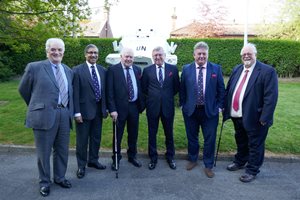
(Left – right) The Members of the Faculty – Dr Richard Williams, Dr Aroop Mozumder,
Professor Jim Ryan, Mr Ken Roberts, Col David Ross & Dr Tim Healing

